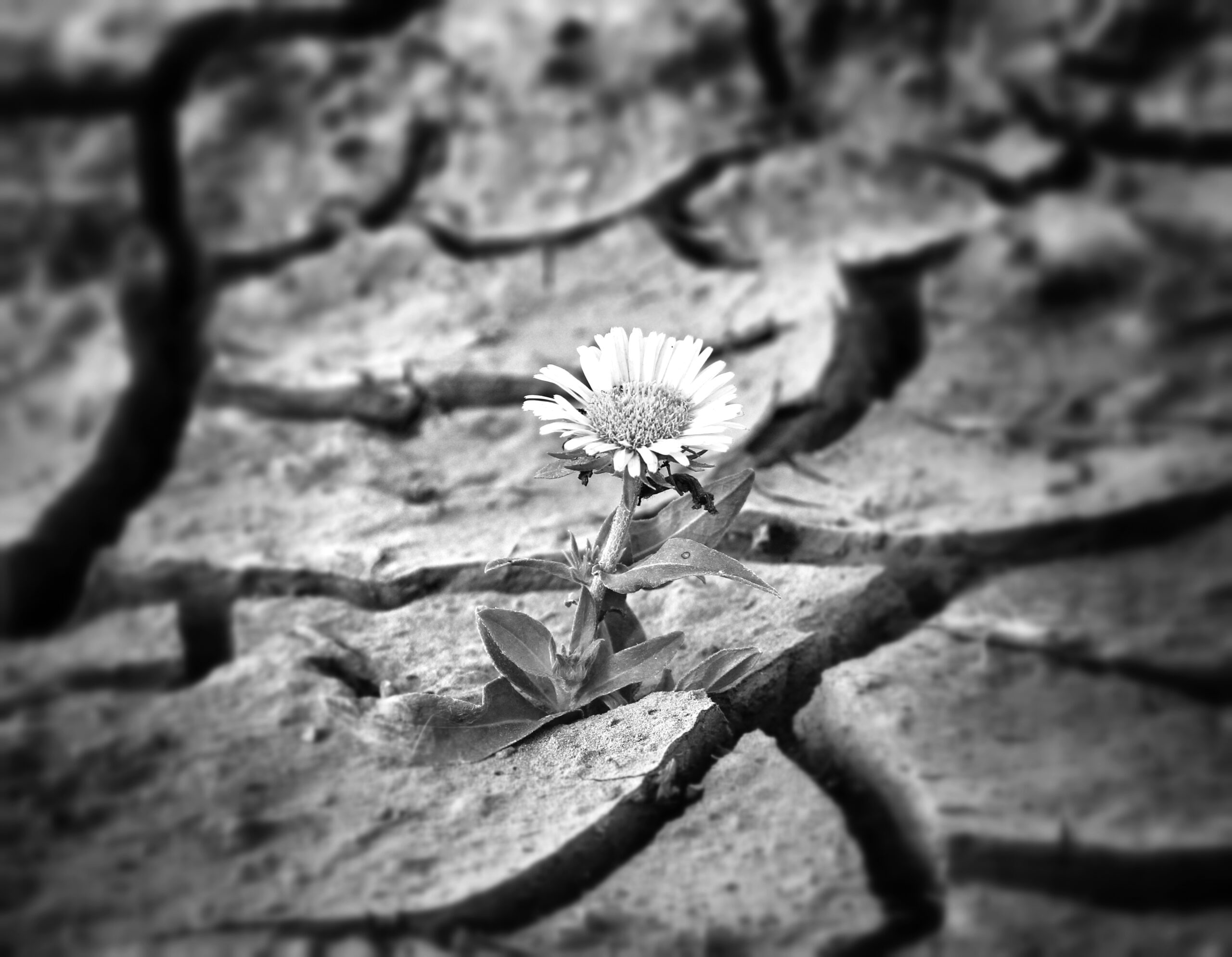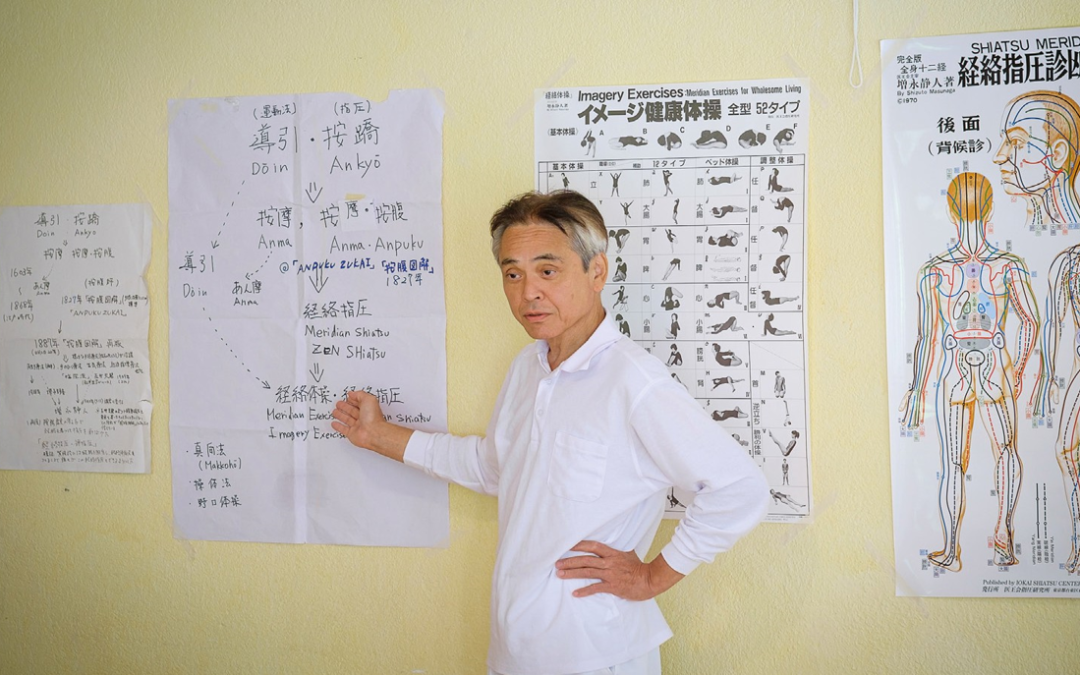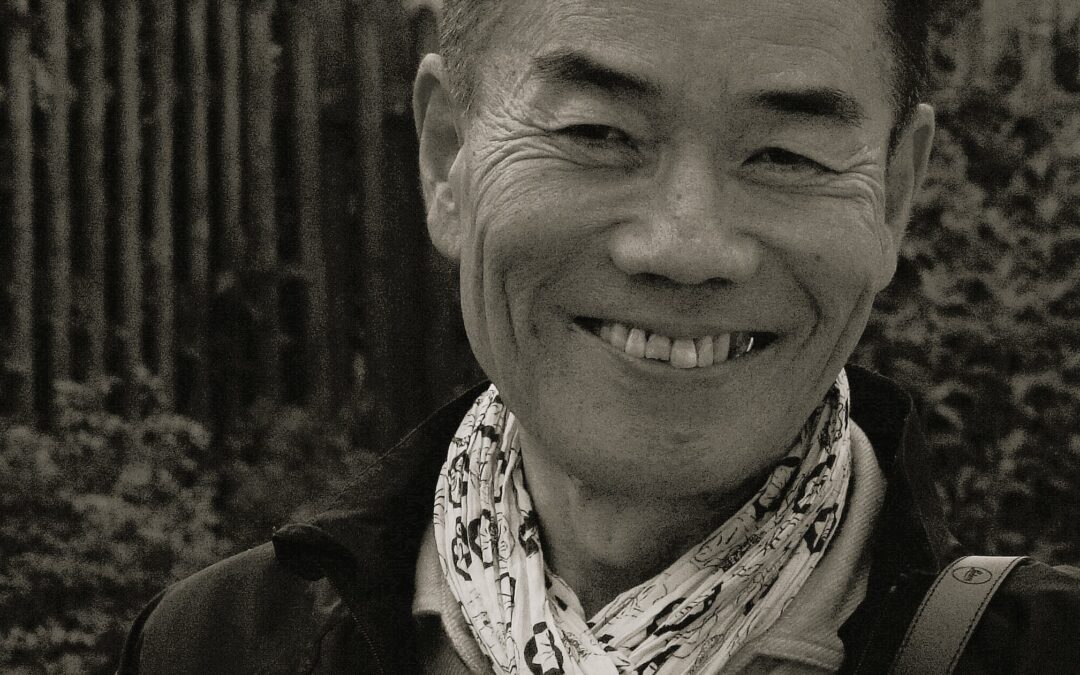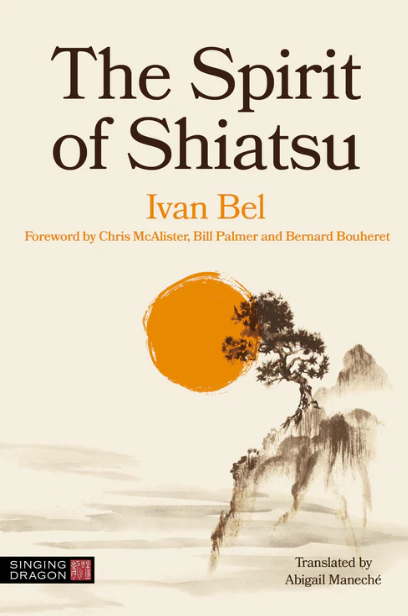In this second and final part of the article, the author uses Oriental medicine to explain more precisely how trauma works. In particular, he details the role of the Metal element, the Po spirit of the Lung and the branch or root of this condition. A very interesting read for all Shiatsu practitioners.
Role of the metal element
In order to understand the progressive process of traumatization and especially post-traumatic stress disorder (PTSD), the system of the five elements and the law of opposition times help us to gain valuable insights. The water element with the organs kidney and bladder is the child of the Metal Element with the organs lung and large intestine. If the child element is weak, the mother element takes over to protect it. In addition, the organs of the water element are closely related to the organs of the metal element through the opposition times. The kidney is in opposition time with the large intestine. The bladder with the lungs. The law of opposition times states that energy can only be in one of the two organs connected by the according opposition time. If the kidney is empty, the large intestine is full. If the bladder is full, the lung is empty. And in the case of traumatic experience, the bladder meridian is more than full, with numerous effects on the lungs. First, there are
direct effects on the breathing. The lung Qi is weakened. In normal condition, it provides deep breathing and the lowering of the Qi. Now the Qi stagnates in the chest cavity and tends to rise. Breathing will be superficial, short. In this way, the body is supplied with less energy. Tiredness can develop. But also forms of depressive mood, in the form of sadness, deep exhaustion and a perceived meaninglessness of one‘s own existence. The common signs of a lung Qi deficiency.
Furthermore, this weakness of the lungs leads to a suboptimal distribution of the Wei-Qi. The physical and psychological immunity are fragile. A thin skin. Stimuli enter the system unfiltered and trigger further stress. The feeling of natural boundaries becomes blurred.
Conversely, the principle of opposition time is also used to fill the lungs via consciously deeper breathing, which draws energy away from the bladder. The bladder meridian can relax. And with it the hypertonus of the sympathetic nervous system. Trauma therapy also works specifically with the breath to manage existing or rising anxiety. The principle is the same. Lungs full, bladder empty. And the kidneys benefit from it. Within one element, we have the same rule: The energy is either in one organ or in the other. It cannot be in both. It is either in the bladder. Or in the kidneys. Strong kidneys promote a sense of security and self-confidence.
The body soul PO
Furthermore, the empty state in the lungs can lead to a detachment of the body soul Po. In TCM, the Po is the entity that connects our consciousness to the body. It gives us the ability of somatic perception. If this connection is not strong enough, a separation between body and mind can occur. This can be the basis for the development of several conditions associated with a trauma. On the one hand, there can be a feeling of alienation from the body, depersonalization. On the other hand, an alienation from the environment can happen, which seems altered or unreal, a derealization: one loses touch with the surrounding reality. A detached Po can also be related to cognitive dissonance, since feelings are the language of the body and thoughts are the language of the mind, and there is no longer a coordinative connection between the two. In addition, access to feelings becomes more difficult, to feelings about oneself and others, which is often accompanied by a decreased interest in social life. This is referred to as numbing, emotional numbness. This difficulty in the perception of feelings often leads to the fact that persons with a detached Po – not only by traumatic experiences – look for particularly intensive bodily experiences in order to be able to feel themselves at all. This search can express itself in addictions, extreme life situations or self-destructive tendencies.
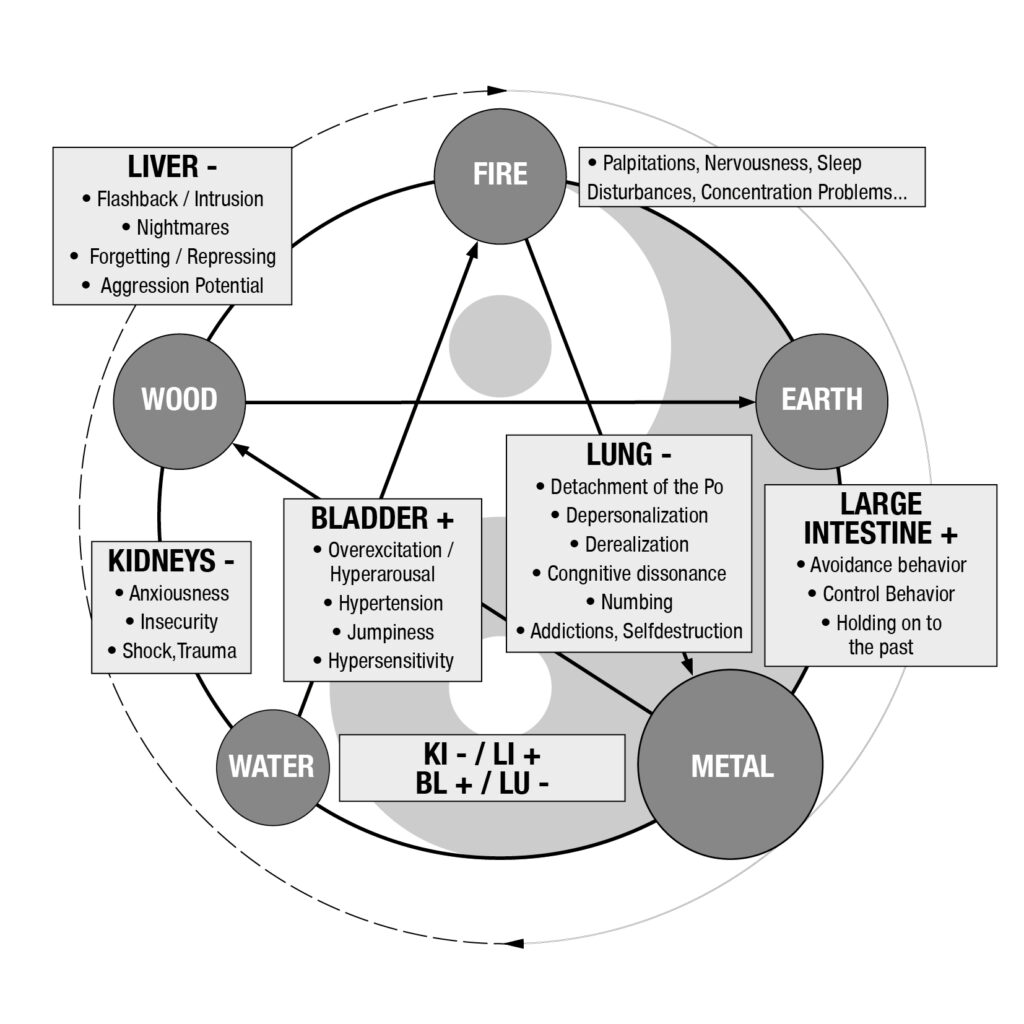
In my experience, the successful stabilization of the Po is one of the key factors in working with trauma clients. This is because the Po also gives us the strength to look positively into the future. It can lead us from a lack of perspective to new perspectives. The Po stands for what is to come. The large intestine stands for what lies behind us.
And the large intestine, like the bladder, is very tense. It stands in opposition time with the kidneys. Kidney empty. Large intestine full. This axis reflects the dynamic between insecurity and control, between security and letting go. The weaker the kidneys, the more the large intestine tries to build control mechanisms in life, to provide security, something to hold on to. A tense large intestine energy holds everything together so as not to lose control. The large intestine is the entity behind avoidance behavior. It is not uncommon to avoid situations that are classified as dangerous, threatening or unpleasant.
Mother large intestine protects child kidneys. However, in post-traumatic stress disorder, avoidance behavior can become a method and can have an impact on broad areas of life. And the large intestine is very sensitive to the slightest changes. As a precaution, it brackets out all issues and possible key stimuli even remotely related to the trauma.
The roots and the branches
In TCM, we speak of the roots and the branches of a condition. The basic energetic structure roots – of a trauma manifests primarily through the water and metal element. The dynamics are: Kidney – -> Bladder + -> Lung – -> Large Intestine +.
The branches are the elements of wood, fire and earth. As the wood element is controlled by the metal element and nourished by the water element, very clear characteristics show up in it as well. The wandering soul Hun, which is closely connected to the Po, is especially affected. In a healthy state, the wood element is rooted in the kidneys. But these are too weak for this anchor function and ensure little stability. This sends the Hun wandering.
We speak of flashbacks, of very vivid memories of the experienced situation, often in the form of nightmares. Characteristically, the Hun is very sensitive to visual triggers, being primarily connected to the eyes. However, it can also be that the Hun has been wandering too much or away, so that the memories of the experience appear to be completely erased, because just as the Po reside in the Lungs, the Hun resides in the Liver, and in TCM the Liver takes on the function of memory consciousness. In general, the liver is not doing so well…
Because wood needs water to stay flexible and alive. However, this cannot be obtained from the kidneys. In other words, the wood dries out. It loses its flexibility and becomes easily inflammable. It loses the ability to adapt to changes and the fast inflammability shows up as increased irritability or aggression potential. And speaking of lack of water: This, of course, directly affects the heart, which is controlled by the water element. And the heart needs cooling because it is 90% yang. Without water, it overheats. The result: heart palpitations, nervousness, insomnia, concentration problems….

And the earth element? In the energetic representation of the Five Elements the earth is in the middle and not between fire element and metal element as in the classical pathological chart of the Five Elements. Due to the polarization of the other four elements, a strong imbalance arises around the center, which can hardly stabilize it. In the worst cases it even tears the center apart. With far-reaching consequences on the digestive tract and of course on the psyche. The branches of post-traumatic stress disorder can be very diverse and it is not easy to find the best possible entry…
The role of persoanlity and the crux of concepts
The basic energetic dynamic between the water and metal elements affects all people similarly in the case of a traumatizing process. However, this energetic dynamic happens within a system that has individual expressions. Accordingly, this expression can shift the emphasis or the symptoms or weight them differently. This also applies to the branches wood, fire and earth. Depending on the setting, there are innumerable possibilities of entry. Nevertheless: Without a harmonization of the basic axis water and metal element it is difficult to achieve really decisive progress. The Po needs to be consolidated. The bladder meridian needs to be relaxed. The kidney needs to be filled. And the large intestine can successively let go as a result.
In the Shiatsu world, it has become trendy to consider any concepts as a limiting factor of the mind and to put intuition in the center of action. This is a shame, because it simply shows that many people simply have a hard time creating a constructive synthesis of knowing and feeling, of logic and intuition.
One is separated from the other and overemphasized. An approach that merely reflects personal preferences. For true unity comes from a fusion of opposites, an integration of yin and yang, and not from the rejection of any particular pole.
In this respect, concepts can be very helpful. Concepts are like a city plan. The city map is not the city. But it gives us a quick overview and a quick orientation. Then you have to put it aside again and be open to what the city brings in terms of experiences and surprises. Sometimes new routes emerge. Sometimes the destinations change. All well and good. But the decisive question should always be: How can I best support the people who come to me? How can I help them in the best possible way? This requires all the resources we have. Body. Soul. Mind. Intuition. Knowledge. Everything.
My intention with this article was to create a rough map of trauma energetics. Maybe you have some additions? Maybe you are more interested in this topic? Then I would like to invite you to the 1st Shiatsu Summit in Vienna. From 30.5. to 2.6. five international experts will dedicate themselves for four days to one topic: Trauma.
Author
- Touching trauma, understanding trauma – part.2 - 29 August 2023
- Touching trauma, understanding trauma – part.1 - 24 August 2023
- Common errors in Shiatsu - 23 January 2023
